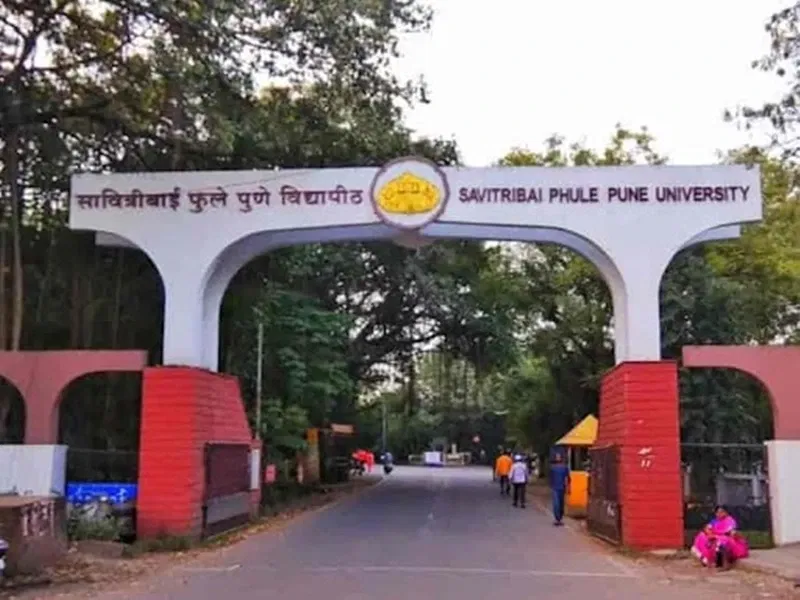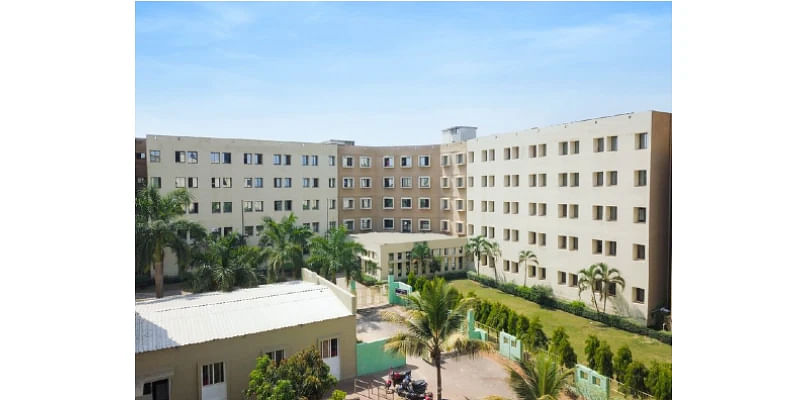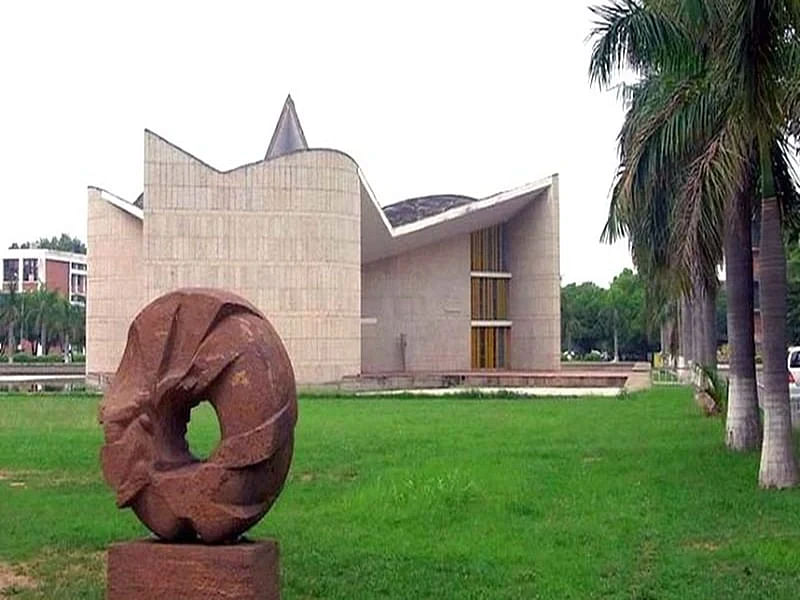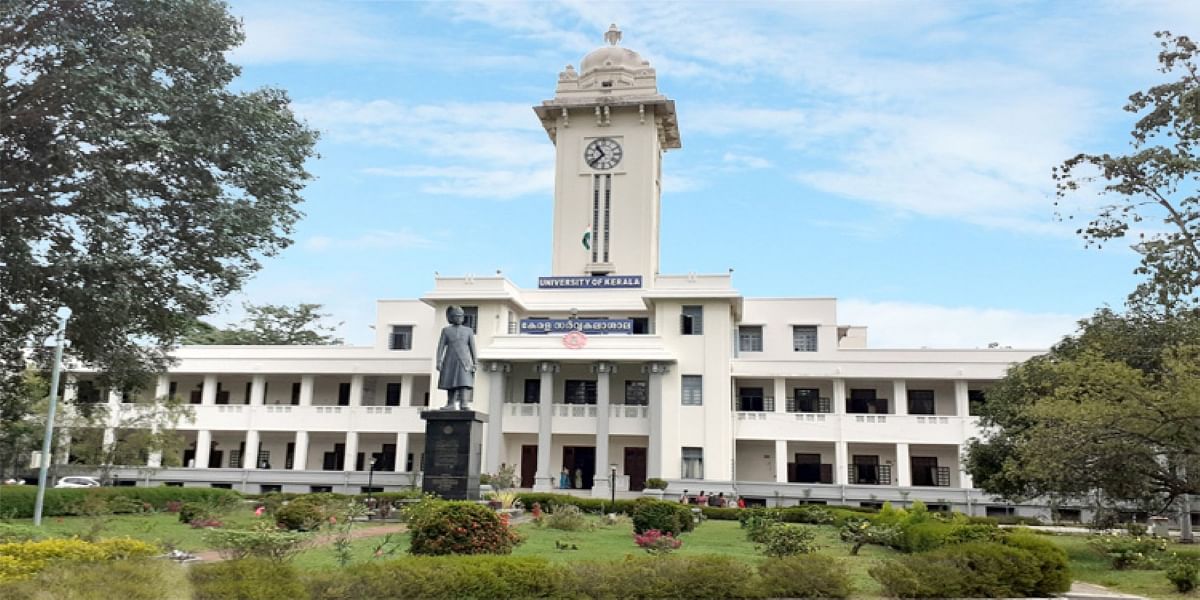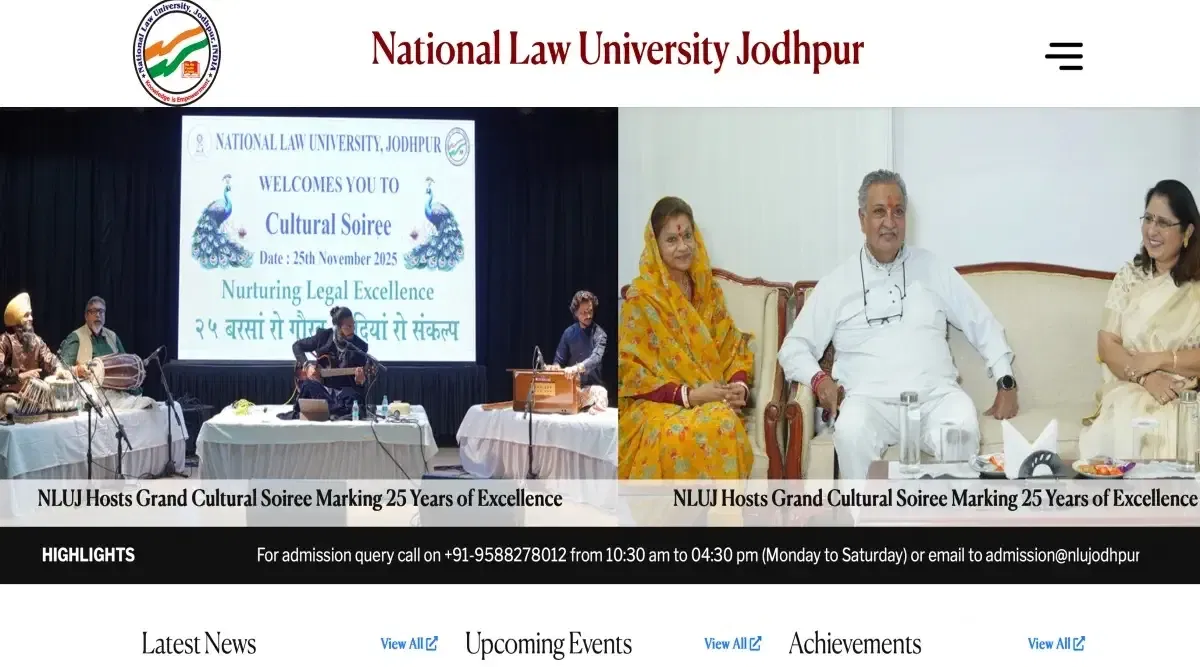LLB Course: Full Form, Duration, Course Details, Fees, Eligibility, Admission

An LLB course or Bachelor of Laws is a three-year professional undergraduate law degree that introduces students to the concepts of corporate law, legislative law, business law, constitutional law, criminal law, contracts, torts, property law, and civil procedures for critical understanding and application in legal affairs.
To be eligible for LLB Admission, students must have a bachelor's degree with a minimum of 45% marks from a recognized university, along with clearing the cut-off for entrance exams such as CLAT, LSAT, SLAT, etc., as per the college requirement. The average LLB course fee ranges from INR 1,200-3,50,000 per year.
The LLB syllabus is designed to provide students with a comprehensive understanding of the law and to prepare them for a career in law. The core LLB subjects include the Law of Contract, Family law, the Law of Crimes, Legal Language and Legal Writing, Women and Law, etc
Table of Contents
- What is an LLB Course?
- LLB Eligibility Criteria
- Why Choose an LLB Course?
- LLB Admission 2024
- Popular LLB Entrance Exams
- Top LLB Colleges in India
- LLB Specializations
- Types of LLB Courses
- LLB Syllabus and Subjects
- LLB Integrated Courses
- LLB vs LLM
- Courses after Bachelor of Laws
- LLB Salary in India
- Career Options After LLB Course
- LLB Scholarship
- Skills To Excel for an LLB Student
LLB Course Details
| Degree | Bachelors |
| Full Form | Bachelor of Laws [Legum Baccalaureus] |
| Duration | 3 Years |
| Age | Minimum age limit is 17 years. |
| Entrance Exam | CLAT, LSAT, SLAT, etc. |
| Minimum Percentage | Candidate should have a minimum of 45% in Bachelors degree. |
| Average Fees | INR 1,200-3,50,000 per year. |
| Similar Options of Study | 5 Year LLB |
| Average Salary | INR 2 - 8 LPA |
| Employment Roles | Legal Manager, Attorney, Lawyer, General Counsel, Legal Advisor, HR Manager, etc. |
| Top Recruiters | AZB & Partners, Trilegal, J Sagar Associates, Khaitan & Co, etc. |
What is an LLB Course?
LLB full form stands for Bachelor of Laws or Legum Baccalaureus. It is an undergraduate course that provides students with a thorough understanding of the legal system, including, all of its guiding principles, ideas, practical applications, and procedures. The LLB course duration is three years.
Overall, the career scope for LLB graduates is bright. Due to the vast curriculum, law graduates have wide career opportunities in law firms with roles like Legal advisor, Advocate, Solicitor, Legal analyst, Public prosecutor, Legal journalist, etc. The annual LLB salary ranges from INR 2 - 8 LPA.
Also, Check: Steps to Become a Judge
LLB Eligibility Criteria
To be eligible for admission to an LLB program in India, you must fulfill the following LLB eligibility criteria:
- The minimum percentage required for LLB after graduation is 45% aggregate marks or an equal CGPA from any recognized institution.
- For the LLB 5-year course, candidates must complete their 10+2 with at least 45% marks in aggregate. Candidates must ensure that they take the entrance exams required by institutions such as CLAT, AILET, etc. as part of LLB course eligibility.
- The minimum age limit to apply for LLB course is 17 years old.
Why Choose an LLB Course?
It is important to understand various deciding factors for choosing an LLB course. Below are a few points regarding why choose an LLB course:
- Recent statistical trends show a bright future for the LLB degree in India. The number of students pursuing an LLB has climbed by 45% over the last five years, demonstrating a rising interest in the field.
- Significant changes to the Indian legal system over the past few years have given lawyers new options.
- The demand for legal services has increased as a result of new rules and regulations, especially in fields like corporate law, intellectual property law, and litigation.
- Graduates may choose to work as attorneys, judges, or legal counsel, or even enter academia in both the public and private sectors.
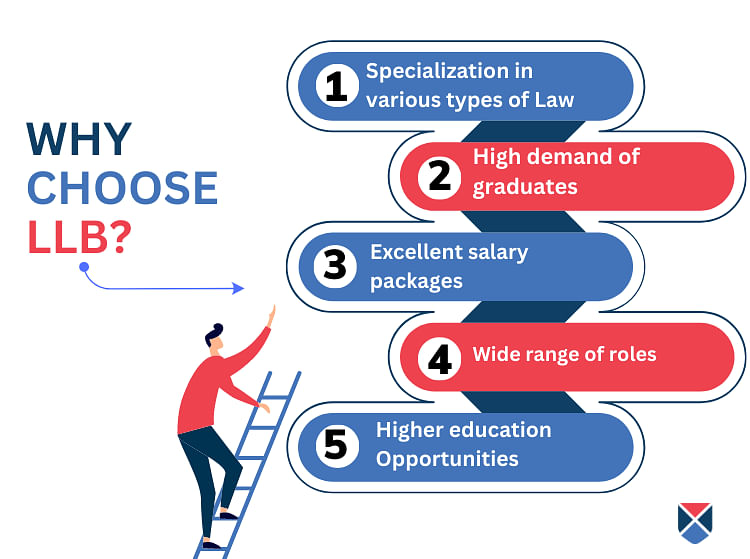
LLB Admission 2024
The process for LLB admission 2024 and course eligibility criteria for LLB in India can differ for each institution. The admission process is done to take either the scores obtained in the relevant entrance exam or based on merit.
Below is the step-by-step LLB admission process:
- Step 1: The course application process can be carried out through online and offline methods.
- Step 2: As required by the college, students must clear entrance exams to be accepted into the course.
- Step 3: Once the merit list is published, candidates need to go for GD and Interview Process as per the college admission criteria.
- Step 4: Upon admission, the students will have to submit their documents for verification and then pay the college fees.
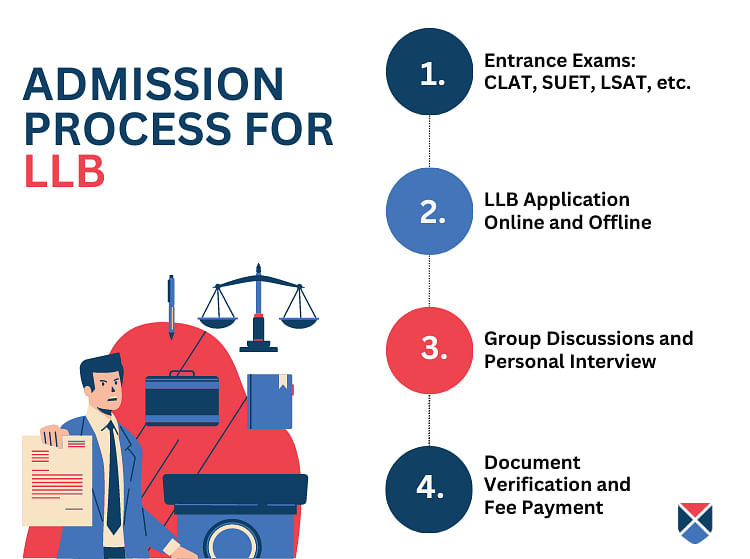
Read More: LLB Admission
Popular LLB Entrance Exams
LLB Entrance exams are conducted by the institution, state-wise and at the national level. Some of the top LLB entrance exams are as follows:
| LLB Entrance Exams | LLB Registration Details | Accepting Colleges |
| CLAT | July 2024- August 2024 (Tentative) | National Law School of India University, Gujarat National Law University, National University of Advanced Legal Studies |
| AILET | Aug 7, 2023 - Apr 30, 2024 | Faculty of Law, SRM University, Xavier Law School, School of Law, The Northcap University |
| LSAT |
Aug 14 – Jan 10, 2024 (January Session) Aug 14 – May 7, 2024 (May Session) |
O P Jindal Global University, JLU School of Law, IFIM Law School |
| SLAT | Dec 13, 2023-Apr 12, 2024 | Symbiosis Law School Pune, Symbiosis Law School Nagpur, Symbiosis Law School Hyderabad |
| CUET | February 2024 (Tentative) | Central University, Tezpur University, Tripura University |
| BHU LLB | February 2024 (Tentative) | Banaras Hindu University, Varanasi |
| PU LLB | June 2024 (Tentative) | University Institute of Legal Studies, Panjab University |
Read More: LLB Entrance Exam
Top LLB Colleges in India
The three-year programme annual course fee ranges from INR 1,200 - 3,50,000 per year which is influenced by various factors such as infrastructure, facilities, etc. The 5 years LLB course fee can be on the higher side compared to the three-year LLB course. The table below provides the breakdown of the 3 years LLB course fees:
| Name of the Institute | Tuition Fee Per Year |
Admission Fees |
Miscellaneous Fees Per Year |
| Symbiosis Law School | INR 3,00,000 | INR 20,000 | INR 1,51,000 |
| ILS Law College | INR 44,000 | INR 4,500 | INR 26,000 |
| University of Lucknow | INR 51,160 | - | INR 18,500 |
| Punjab University | INR 13,500 | INR 2100 | INR 5,000 |
| NLSIU, Bangalore | INR 2,44,500 | INR 11,000 | INR 1,02,500 |
| NLU, Delhi | INR 1,42,000 | INR 10,000 | INR 2,23,000 |
| SNDT Women's University | INR 15,000 | INR 550 | INR 10,340 |
| Christ University | INR 2,40,000 | INR 5,000 | - |
| JMI, Delhi | INR 2,200 | INR 100 | INR 8,000 |
| Chanakya Law University | INR 1,04,500 | - | INR 80,500 |
| IIT Kharagpur | INR 1,00,000 | INR 15,000 | INR 60,000 |
| Tamil Nadu Dr.Ambedkar Law University | INR 42,000 | INR 5,000 | INR 40,135 |
| The University of Burdwan | INR 1,200 | INR 200 | INR 5,130 |
| Babasaheb Bhimrao Ambedkar University | INR 1,20,000 | INR 1,500 | INR 6,000 |
Also, Check: LLB Course Fees: Government/Private Colleges Cost, Scholarships
Top City Wise LLB Colleges in India
Below listed are location-wise LLB colleges in India with the annual fees:
| Cities | Tuition Fees Per Year |
| LLB College in Delhi | INR 12,000 - 1,60,000 |
| LLB College in Lucknow | INR 34,000 - 2,00,000 |
| LLB Colleges in Pune | INR 16,000 - 2,42,000 |
| LLB College in Jaipur | INR 30,000 - 2,98,000 |
| LLB College in Kolkata | INR 57,000 - 1,35,000 |
| LLB Colleges in Bangalore | INR 80,000 - 2,00,000 |
| LLB Colleges in Mumbai | INR 30,000 - 2,00,000 |
| LLB College in Indore | INR 40,000 - 1,98,000 |
| LLB Colleges in Chennai | INR 50,000 - 2,10,000 |
| LLB Colleges in Ahmedabad | INR 50,000 - 2,00,000 |
LLB Specializations
LLB courses offer students opportunities to be specialized in various domains such as labor law, family law, banking law, etc., as per their future goals and interest area. Following are the various specialization under the LLB degree:
- Constitutional Law
- Labour Law
- Family Law
- Intellectual Property Law
- Taxation Law
- Corporate Law and Governance (including International Business)
- Criminal Law
- Environmental Law
- Human Rights
- Property Law
- Banking Law
- Company Law
- Investments and Security Law
- Law of Insurance
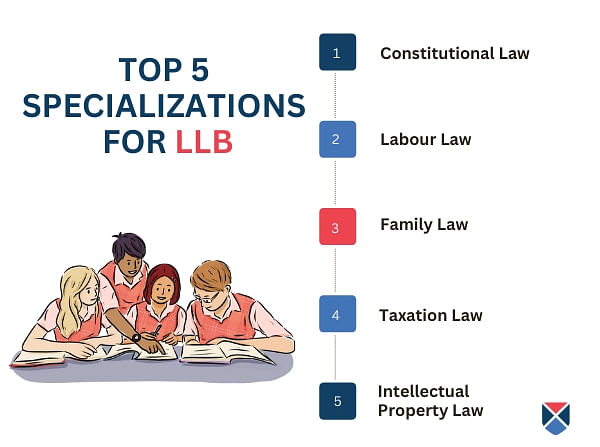
| Cyber Law Courses | Criminal Law Courses |
| Corporate Law Courses | Business Law Courses |
Types of LLB Courses
Before introducing the 5-year integrated law program, law students had to do a three-year LLB course. When it comes to different types of LLBs or law courses after graduation, the standard three-year programme is almost universal, as almost all universities offer it. However, in recent years, the course has been challenged by the 5-year course, gaining popularity.
Below mentioned is the LLB course details:
| Type | Basic Eligibility | Duration |
| LLB degree | 45% aggregate marks in class 12th | 3 Years |
| Integrated Law program | 50% aggregate marks in class 12th | 5 Years |
Read More: LLB 3 Years vs LLB 5 years
LLB Syllabus and Subjects
The LLB course is a study for implementing and enhancing law skills. This branch of law involves studying, developing, and implementing law skills. Some of the subjects that are included in the LLB course syllabus are listed below:
| LLB Subjects | Topics Covered |
| Jurisprudence | Nature and definition of Jurisprudence, Jurisprudence and their methodology, The concept of State and Sovereignty, Administration of Justice |
| Law of Contract | Privity of Contract, Terms Of Contract, Types of Contract, Formation, Intention to Create Legal Obligation, Capacity to Contract, Limits of Contractual Obligation |
| Laws of Torts | General Defences, Parties and their capacity, Masters and Servants, Remoteness of Damage, Discharge of Torts, Specific Torts |
| Family Law | Law of Marriage, Law of Adoption, Law of Guardianship, Maintenance |
| Law of Crime | General Defences, Parties to a Crime, Jurisdiction, Punishment, Specific Crimes, Law of Attempt |
| Property Law | Specific Transfers, Lease, Gift And Exchange, Charge, Easements, Licenses |
Read More: LLB Syllabus and Subjects
LLB Integrated Courses
LLB integrated courses combine undergraduate and graduate legal education. This 5-year course typically includes both theoretical and applied field of law. Below is a list of integrated LLB courses:
LLB vs LLM
LLB course that helps students to be well-prepared for a career in law or related professions by developing a firm foundation in legal principles. Below mentioned are similar course comparisons which students can pursue:
Given below are the differences between LLB and LLM:
| Name of Course | LLB | LLM |
| Full-Form | Bachelor of Laws | Master of Law |
| Duration | 3 Years | 2 Years |
| Eligibility | Candidates must have come through their bachelor's level with a minimum of 45% aggregate marks. | 50% in BA LLB, B.Sc LLB or B.Com LLB |
| Fees Per Year |
INR 1,200 - 3,50,000 | INR 2 ,00,000 - 5,00,000 |
| Salary |
INR 2,00,000 -7,00,000 | INR 8,00,000 - 20,00,000 |
| Employment Roles | Advocate, Solicitor, District & Sessions Judge, Sub-Magistrate, etc. | Advocate, Solicitor, Attorney General, District and sessions Judge, etc. |
Read More: LLB vs LLM
Courses after Bachelor of Laws
Students who want to pursue higher education after a Bachelor of Law can do certification courses in related fields or do their master's and other certification courses. Some of the options are listed below:
- LLM
- Ph.D. in Law
- MBA
- M.Phil in Law
- Certification Course in Labour Law and Administrative Law
| MBA After Law - Is it worth it? |
LLB Salary in India
LLB qualification leads graduates to ample career opportunities from working as an advocate to a business consultant. The annual LLB salary in the India package ranges from INR 2 - 8 LPA [Source: Glassdoor].
| Job Role | Annual Salary |
| Litigation Lawyer | INR 8.2 LPA |
| Legal Analyst | INR 2 LPA |
| Legal Researcher | INR 7.8 LPA |
| Public Prosecutor | INR 6.5 LPA |
| Legal Journalist | INR 3 LPA |
Read More: LLB Salary
Career Options After LLB Course
An LLB course makes student equip with all the required skill sets and helps in getting the below-mentioned job profiles for the degree holders:
- Business Consultant
- Advocate/Lawyer
- Human Resource Manager
- Assistant Advisor
- Human Resource Manager
- Attorney General
- Deputy Legal Advisor
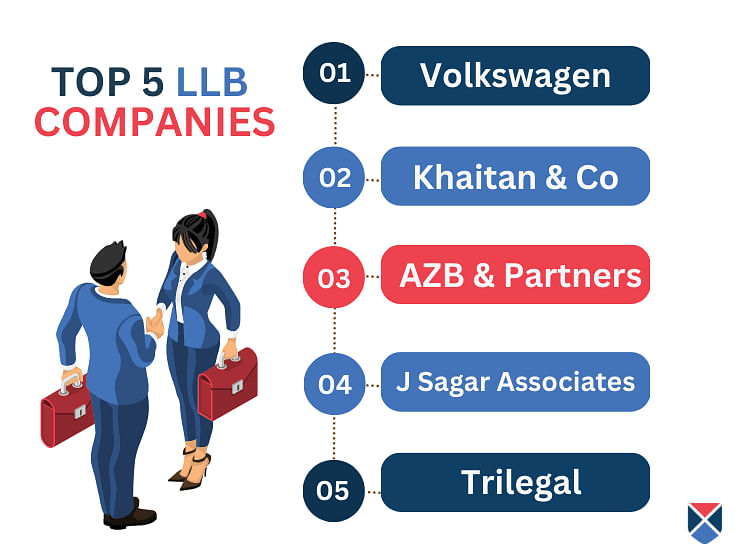
| How to Become a Lawyer? | How to Become a Police Officer |
Top companies employing LLB course Graduates:
- Kirkland & Ellis L.L.P.
- Latham & Watkins L.L.P.
- Nike
- Toys R Us
- Volkswagen
- Denton
Read More: Courses and Career Options After LLB
LLB Scholarship
An LLB scholarship in India is a great chance for future attorneys to follow their goals and have a good influence on the legal community. Below mentioned are a few scholarships provided to students for LLB courses:
- GEV Memorial Merit Scholarship
- Aditya Birla Scholarship Programme
- PNB Housing Finance Limited Scholarship
- Central Sector Scheme of Scholarship
- Quill Foundation Scholarship
- Post-Matric Scholarship for Minorities
- Post-Matric Scholarship for Students with Disabilities
- Nirankari Rajmata Scholarship Scheme
- Fully Funded Science & Law School Scholarship
Read More: LLB Scholarships
Skills To Excel for an LLB Student
During the Legum Baccalaureus or LLB course, aspirants will gain the following skills which will help them to perform their respective jobs in the future more efficiently:
- Interpersonal Skills
- Time Management and Organisation Skills
- Communication Skills
- Decision-Making Skills
- Critical Thinking
- Leadership Skills
- Empathy and Compassion
- Honesty and Trustworthiness
Top LLB [Bachelor of Law] Colleges
Top Law Entrance Exams
LLB Fee Structure
FAQs on LLB
Q: Can I do LLB after graduation?
Q: is there any entrance exam for LLB after 12th?
Q: What is LLB full form?
Q: Can I pursue LLB through distance education?
Q: Is CLAT compulsory for LLB?
Q: What are the four types of laws that can be pursued under LLB?
Q: How can I get admission in LLB?
Q: What is LLB duration?
Q: What is the average LLB fees?
Q: What is LLB future scope?






